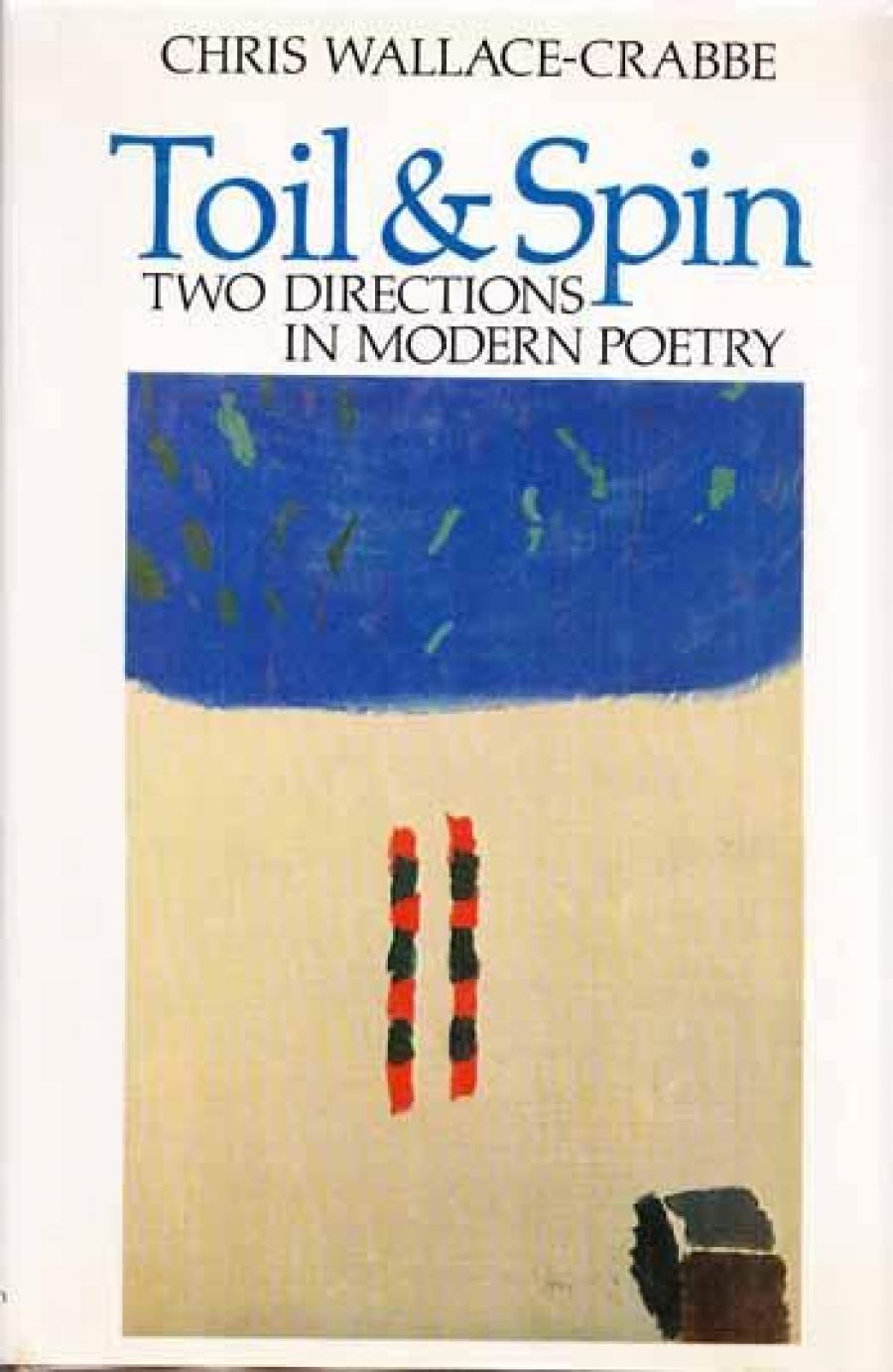
- Free Article: No
- Contents Category: Literary Studies
- Custom Article Title: John McLaren reviews 'Toil and Spin' by Chris Wallace-Crabbe
- Review Article: Yes
- Article Title: Make it new
- Online Only: No
- Custom Highlight Text:
In a world which has lost its faith and its standards, the situation of the creative artist is both central and precarious. As Wallace-Crabbe sees it, he must stand inside and outside society at once, be both totally involved with himself and totally responsive to his society. While doing this, he must create not only his own audience but even his own language.
In this series of essays, Wallace-Crabbe explores this dilemma in the work of contemporary English-language poets ranging from Thomas Hardy to Elizabeth Bishop, and from W. H. Auden – ‘the good Christian practices light verse’ – to Robert Lowell and Ezra Pound. The essays both illuminate the work of the writers he discusses and contribute to our understanding of the crucial problem of contemporary culture.
- Book 1 Title: Toil and Spin
- Book 1 Subtitle: Two directions in modern poetry
- Book 1 Biblio: Hutchinson of Australia, 151 pp, $9.95 pb
Each of the essays is grounded in the kind of detailed analysis of the writing being considered which has come to be associated with the Leavis school of criticism, and thus implicitly offers a challenge to the more fashionable kind of contemporary writing about literature which treats the work as symptom rather than prism. Wallace-Crabbe demonstrates the value of his kind of close reading, which shows us how the writers he examines are shaped by their society and yet alter our understanding of it.
This approach not only helps us to see what Ezra Pound may in fact have to offer us in his ‘Pisan Cantos’ towards understanding the conflict between classical values and a precise historical situation, or about what Robert Lowell’s Life Studies show us about the conditions of survival in a world which is disintegrating personally, socially and culturally, or about the gains and losses that his choice of the colloquial mode offers to Bruce Dawe, but also shows how American and Australian poetry is peculiarly characteristic of industrial civilization.
The function of poetry, Wallace-Crabbe claims, is to testify accurately to a particular aspect of historical reality:
not the large-scale prospect, diagnosis and interpretation, and not the facts of the world crumpled together under the burden of an apocalyptic vision ... (but) delicately and sharply, the way impersonal forces play upon one man’s consciousness at a particular point of time.
His essays show us just what the consciousness of these writers tells us about our time.
His study of Lowell suggests that the distinguishing characteristic of the people in his poems is that their inherited wealth gives them security and a place in the world, but not the manners and the sense of vocation to fill it. This characteristic is one shared by the wealthy colonials of both America and Australia, yet is also pertinent to a Europe which has lost contact with the old forms of its society yet has still not discarded the modes of discourse which they created. It is the writers of the new world, with their energy and detachment, who can discover and renew the values of the old.
Wallace-Crabbe’s understanding of the cultural relationships embodied in the particular writing does not free his book from error. His attitude tends to move too easily to the purely aesthetic, so that he fails to understand the importance, for example, of Dawe ‘s locating his poem of suburban fear in the everyday reality of suburban security, or the relation between Judith Wright’s ecological politics and the feeling in her poetry of being completely at home in her social and physical landscape.
It is possible to regret, also, that the origin of the book in separate essays has not allowed him to develop further his pattern of oppositions between the democratic and the experimental, the constructivist and the expressionist poets. This scheme illuminates individual essays and provokes thought, but will bear further development.
Meanwhile, this book can be regarded as a statement of critical work in progress, an introduction for students to important contemporary writers, and a challenging reassessment of the current literary and cultural situation.


Comments powered by CComment